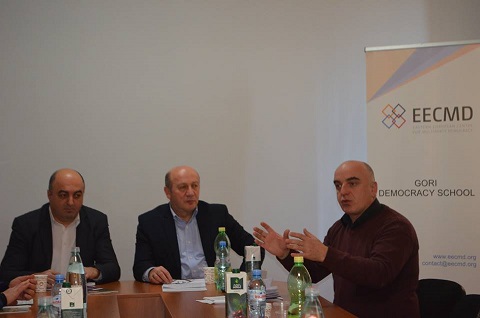Lado Bitchashvili, Shida Kartli
10 years ago, during the Russia-Georgia armed conflict, five houses were burned in Zardiaantkari village: two of them were completely burned and three other only partly. It is already eleventh year, as local Tsitsino Elikashvili has been living in the half-burned house together with her family. Meanwhile, two special commissions on the elimination of the damage caused by the armed conflict in Zardiaantkari were created. The first commission was set up in the local self-government during the governance of the United National Movement. The second was established in the central authority after the government changed in 2012. The residents of Zardiaantkari village are not aware of the conclusions of either commissions ; the only thing they know is that nobody compensated their damage and they still live in the damaged houses.
“My house belongs to the category of half-burned houses. We could not restore it with our resources and the government gives only promises. The commissions are created and they promise compensations and restoration of the damaged house but no promises were kept yet,” Tsitsino Elikashvili said.
On February 20, Human Rights Center organized the meeting in the Gori Democracy School to discuss the problems in the villages alongside the occupation line and the ways to resolve them. Residents of Zardiaantkari village, representatives of the nongovernmental organizations and local self-government participated in the meeting.
During the meeting, HRC representative Ucha Nanuashvili spoke about the current situation in the villages alongside the occupation line.
“Big part of the problems of the people living near the dividing line was caused by the 2008 armed conflict and they are still unresolved. Many families have not yet received assistance from local or central authorities to restore their damaged houses. The state has not granted victim status to one part of the damaged people that is necessary for them in the process of legal and investigative proceedings ongoing on the local and international levels. People living alongside the dividing line are subjected to arbitrary detentions almost every day and the state response is ineffective. Locals often cannot register the plots located even on the Georgia-controlled territories,” Nanuashvili said and called on the local and central authorities to work in coordination to compensate the damage of the population during the 2008 armed conflict.
“10 years have passed and many people still wait for the compensation and help. This problem should have been already addressed and engagement of both local and central governments is important. Unfortunately, now we face the situation when local population actively migrate from the region and it is not ordinary migration; it means we give up our territories to the occupants and the government does not realize these risks,” Ucha Nanuashvili said.
Gori Municipality Mayor Konstantine Tavzarashvili spoke about the implemented and planned projects of the local government, which aim to improve the conditions of conflict affected people. He said, the commission will study the conditions of the houses damaged during the 2008 war in Zardiaantkari and the issue of restoring them will be on the agenda.
“Several houses were burnt in Zardiaantkari during the war and we evaluated the situation on the place. There are families, who received compensations in the amount of 15 000 USD to restore the damaged houses. Some families from Zardiaantkari are settled in one of the kindergartens in Gori. The government’s commission studied and recorded everything and the central authority still works in this direction because these people need attention,” the Gori municipality mayor said.
Part of Zardiaantkari residents spend winter in the former building of kindergarten in Gori, where they have temporary accommodations because their houses in the villages do not have roofs and windows and cannot heat homes in winter.
Tsisana Taziashvili from Zardiaantkari: “In winter it is almost impossible to live in the village. The commission members arrived twice; they evaluated the damages but nobody restored the houses. After today’s meeting we hope the problem will be resolved and we will have normal conditions at home.”
Human Rights Center organized the meeting about the problems of the conflict affected people in the frame of the project “Legal Aid and Human Rights Monitoring,” which is implemented with the financial support of the National Endowment for Democracy.
HRC defends the interests of the war victims on the national level as well as in the European Court of Human Rights and in the International Criminal Court.
News
December 13, 2023
Ethnic minorities outside the peace dialogue
November 6, 2023
‘Peace’ agenda of political parties
Popular
Articles
February 13, 2024




